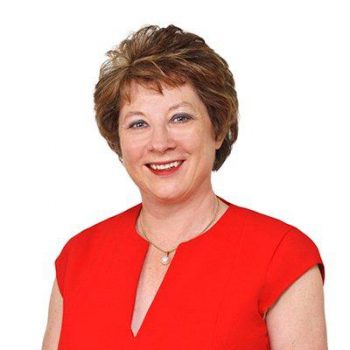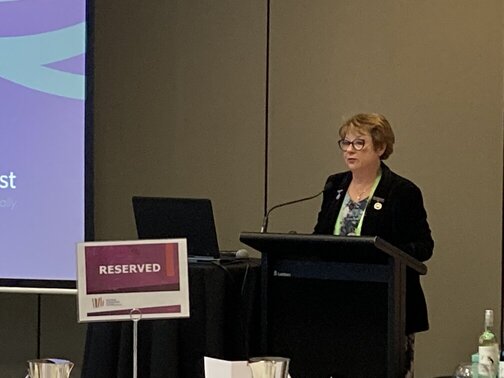Australia’s Gender Equality Council Chair Coral Ross travelled overseas on a Churchill Fellowship in 2020, just before covid-19 shut the world down.

Ms Ross, then a councillor at the City of Boroondara and national president of the Australian Local Government Women’s Association, had been awarded the 2018 Fellowship to look into improving gender equality in local government.
During an eight week fact finding mission she questioned local government leaders from 50 organisations in the US, Canada, the UK, Sweden and Germany about what they were doing to foster gender equality in the sector.
The result was a 75-page report compiling best practice from around the world and making more than 30 recommendations for the Australian government to consider.
“It’s the first time that that has actually been collated,” she told Government News.
“I’ve found 52 different intitiatives to get women elected, I’ve made 33 recommendations based on those.”
She says unlike in Australia, significant resources have been made available overseas to investigate gender equity in local government and come up with proposals for the way forward.
“What my report has done is borrowed, if you like, each of the recommendations and each of this huge body of work that there is overseas, because most of the barriers are universal.”
“So what I’ve done is basically go through these and say ‘this is something which is applicable for us in Australia’ and these are the things that we need to do to get rid of those structural barriers within councils,” she says.
“What my report has done is borrowed, if you like, each of the recommendations and each of this huge body of work that there is overseas, because most of the barriers are universal.”
Ms Ross says Sweden has the highest representation of women in local government, and despite state-by-state discrepancies, percentage-wise Australia is doing well.
Voting system
However Ms Ross says each country has their own unique barriers.
For some, the voting system can be the barrier to women being elected, especially countries that don’t have compulsory voting.
“Countries that have compulsory voting and preferential voting are the ones where women do do better.”
“Countries that have compulsory voting and preferential voting are the ones where women do do better,” she says.
“Whereas the UK, US and Canda have a first-past-the-post system, as does WA.”
Voting in council elections in NSW, meanwhile, is above and below the line, which tends to attract people in political parties, and can disadvantage women.
“That might be part of the reason why NSW has a lower representation,” she says.
“Political parties can be a gatekeeper when they don’t have quotas and they don’t preselect women.
“The rest of the country doesn’t have the political party involvement that NSW does and so that’s why you probably see higher levels of women being represented in the other states.”
Bullying and harassment
The recommendations in Ms Ross’s report cover a number of themes including structural and cultural issues; sexual harassment and bullying; funding; identifying candidates; and mentoring and education.
She says in the US they are very good at finding candidates, while councils in the UK and Germany have gender equity officers.
“When they’re holding a forum the gender equality office knows who all the women leaders are in the community and they invite them to come along to the forum,” she says.
In Sweden and Germany councillors have to be given time off work to attend council meetings, and Ms Ross says she’s like to see this replicated in Australia, based on the system for volunteer firefighters.
Sexual harassment and online bullying of local government issues is a major problem overseas, Ms Ross says, particularly in the US where the 2016 murder of MP Jo Cox appears to have opened the floodgates.
But this means countries like the US and UK are further ahead than Australia in terms of preventing this kind of behaviour with civility programs, education campaigns and even the establishment in the UK of Glitch – a charity devoted to ending online abuse.

Education
Other initiatives included having gender equality as part of the school curriculum – in the US some programs begin in kindergarten – and having civics as a much more developed part of the schools curriculum.
“They say by the time women come into government in their 40s or 50s it’s too late, they need to be coming in at an earlier stage,” Ms Ross says.
Other initiatives were focused on encouraging women to stand.
“They say by the time women come into government in their 40s or 50s it’s too late.”
Another initiative that impressed Ms Ross is the hugely successful #askhertostand initiative which in the US, Canada and UK has been allowing anyone to nominate a woman run for election.
“Anybody can access it and say I think Mary Smith would be a great councillor” and why, and then the organisation contacts Mary Smith and says ‘you’ve been suggested as a great councillor.
“We know that women need to be encouraged and this gets them to be thinking about it.”
Need for funding
Ms Ross says while the recommendations all over solutions to gender equality in local government, they won’t work without funding, something that overseas comes from government or, particularly in the US from wealthy philanthropists like Melinda Gates, who has provided $1 billion for gender equity programs.
“What came out loud and clear was that none of the programs can happen without money,” Ms Ross said.
“What came out loud and clear was that none of the programs can happen without money.”
“If you don’t have that govt funding then things don’t happen.
Ms Ross says the key lesson is that that gender equity in local government isn’t about fixing women, but fixing the system.
“What the fellowship showed was we can introduce some of the programs which they have overseas and they will and can make a difference,” she says.
“But it will just be a revolving door unless we tackle to systemic and cultural barriers that prevent women from being elected or standing for any tier of government.”
Ms Ross spoke about the report at an ALGWA conference held in Canberra as part of the ALGA National General Assembly.





Leave a Reply